Let us then shrug off the confines of April 22nd ...with its bombast, commercialism, and triviality. Instead, let us move forward with integrity, passion, intelligence, openness, and an unrelenting power for change. - Jeremy Hance
After April 22nd of this year, I am no longer a fan of Earth Day. It has become a strange pseudo-holiday that allows individuals, governments, corporations, and the media to focus a miniscule spotlight on our environmental crises, and then breathe a sigh of relief over the following days and weeks as they to go back to their old ineffectual ways. It is a day to stem the guilt of the sorry state of our natural—and 'civilized'—world. It is not a day where environmental education actually reaches the masses, or when people wake to the need—not the luxury—to change our ways. It is the opposite: a chance to feel good about our time's greatest crisis.
More hope lies outside Earth Day, beyond its cutesy confines that treats endangered species like stuffed animals, greedily pushes unnecessary products as 'green', and suggests that planting a tree is a duty rather than a joy. Instead of all this Earth Day bombast, I see hope in the fact that it is 2008 and the collective consciousness of the world is changing—albeit slowly. What we lack is action manifested out of this burgeoning consciousness.
The environmental movement has never been so widespread or so widely accepted. Environmentalists are no longer confined to fringe-groups; being 'green' no longer implies elitism; and, most importantly, care and respect for the Earth is no longer seen as somehow dismissing human needs, especially economic. As one of the catch-phrases of the decade 'being green' perhaps portends a future where humanity is filled with a deeper awareness and understanding of the ecosystems we inhabit (so long as we keep from 'commercializing' it). Many circles—political, cultural, and religious—are awakening to the fact that our lives, and those of all other species remain intertwined; they are beginning to see that nature is not somehow separate from humankind—or worse, adverse to it. Astoundingly, despite all our technology, our distracting entertainment, our artifice, we are coming to understand that we remain as symbiotically linked to other species, to ecosystems, to nature as ever.
| 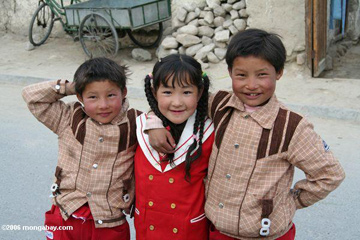 Children in Kashgar, China. Photo by Rhett A. Butler Children in Kashgar, China. Photo by Rhett A. Butler |
Such cultural movements are amazing. Our world faced Earth Day 2008 with a growing sense for the need of humanity to tackle the environmental issues that have been growing exponentially for centuries: each consecutive generation has used more resources than its predecessor, at the same time the global population has doubled, tripled, quadrupled, until somehow we've found ourselves in the midst of a humankind reaching 6.6 billion people, a minority of whom use the majority of resources without question or concern, devouring a finite world. This overpopulation and over-consumption are the backbones behind our crises: climate change, mass extinction, wide-scale pollutants, lack of resources, shortages of water and food—trust me the list goes on. While our global society has awakened to the problems we face because of our long disregard of nature, we have yet to confront the issues in any meaningful way.
Due to spending the last nine months as a journalist for
Mongabay.com, I am fortunate to have come to know countless organizations—many of which the public has never heard of—who spend time, energy, and resources attempting to educate the public, affect change, and save and restore what remains of our embattled ecosystems, species, and civilizations. I know of innumerable citizens who spend more hours than I could ever count working for a better world. Their dedication, optimism, and pugnacity in face of seemingly insurmountable odds leaves me in awe. These are people who do not give-up, who remain open-minded to every possible means; these are people who stay up into morning hours for pittance (sometimes less than that), who do so without accolades and recognition, who strive to make their voices heard even while they grow hoarse. They have faith in the ability of humankind to face itself.
 Gorilla in Gabon. Photo by Rhett A. Butler Gorilla in Gabon. Photo by Rhett A. Butler |
Believe me, it is far easier in this world to not be one of these heroes. It is far easier to choose a different path for one's self: a path divorced from changing what must be changed. It is far easier to go on ignoring problems that may appear hopeless. Yet, if there is anything I have learned in nine months of conservation and science writing, it is that what we face is not without doable solutions. I am presented with them day-after-day from passionate and dedicated individuals.
Many in our world are beginning to listen. I applaud those who have taken up some portion of the popular environmental movement: those who buy local and organic foods, switch off appliances, carpool or bike, recycle, change light bulbs, go vegetarian or vegan, purchase carbon credits, or donate a portion of hard-earned funds to environmental groups. I applaud anyone who has consciously changed habits to have less impact on their world. But I cannot mince words here; I feel it is time to be honest: what we are doing is not enough. A small percentage of the consumptive developed world making a few small changes here and there is not going to stop a future for our children that will be bleaker, harder, and far-less secure—not to mention a world hallowed out by loneliness, where silence is our only echo.
The changes in our understanding—the awakening of the global-consciousness to the importance of the environmental crises—must now manifest itself in action. There is a time for thought and debate and slow transitions, and there is a time when problems require large-scale actions. This is that time; it merely waits for us to act.
What Should Be Done?
|  Tree frog in Thailand. Photo by Rhett A. Butler Tree frog in Thailand. Photo by Rhett A. Butler |
While it is obvious to many—and has been obvious for a long time—that drastic, large-scale, and meaningful actions are required to stave off devastating climate change, mass extinction, and increasing conflicts over dwindling resources, still our governments dawdle. Still, they sit on their hands as if the problems will disappear through debate and discussion—as if talk had the ability to change reality. Still, they use the excuse that the economy is more important than environmental health, as if the two were not intertwined—as if a future world of global warming, total loss of forests, increasing desertification, devastating pollution, and an unending population rise could actually produce a good economic situation. I can think of no current government that has approached any of our environmental issues with the seriousness they require. A few are striving, and I applaud their efforts, but even they fall short. Where there is awareness and acknowledgement, courage is still lacking.
This unbearable situation places more and more of the burden on the young and the unborn: they will be forced to live under the world we have wrought. They will see their parents and grandparents as plunderers, who sold out their future for ease and profit. To prevent this, the burden of change must rely on us. If our governments are thus far unwilling to confront these problems, we must force them to. Concerned and aware citizens should not become softer and quieter, rather our voices need to grow and combine until our governments stop putting off what needs to be done now for another day, another administration. They wish to avoid political fallout from making meaningful changes to our society—so we must make certain that there is fallout from hemming and hawing, from endless stalling. We must tell our governments that we are ready and happy to make the changes required as a collective society to create a civilization that is in harmony with the natural world.
| 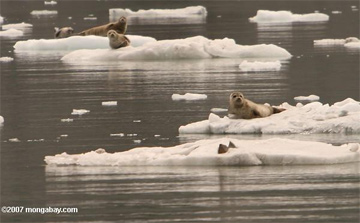 Seals in Glacier Bay, Alaska. Photo by Rhett A. Butler Seals in Glacier Bay, Alaska. Photo by Rhett A. Butler |
In the same way, we can no longer allow our media to subsume the environment to every other issue. While coverage may be improving, it is hardly doing so with the speed required. Certainly, one can find information about climate change, even sometimes on the front page. But when perennial ice disappearing from the arctic in March is basically ignored, when the Wilkins Ice Shelf hanging by a thread receives only a little more notice, one knows that the media is still not doing their basic job of informing the public. Even worse is the lack of coverage—namely none—on the current mass-extinction. Some scientists believe the alarming rate at which species are disappearing is of even more concern than climate change, but one would not know it by scanning the papers or watching the news. We can read about endangered elephants and tigers and whales—but that is a single drop in an ocean compared to the life-forms disappearing without a note or even a name. Shortages in food, gas, and water are gaining greater notice, especially as they are beginning to affect costs in developed nations, but more serious time needs to be devoted to the environmental causes of these shortages if our public is ever to tackle them effectively. Coverage of the environmental crisis needs to stop waiting for massive events, i.e. the collapse of an ice shelf, the extinction of a charismatic mammal, to make the front pages. If every detail of an election campaign can be scrutinized then why should 'small' environmental changes and novel research from the world's best scientists be systematically ignored, and at best buried?
|  Centipede in the rainforest of Malaysian Borneo. Photo by Rhett A. Butler Centipede in the rainforest of Malaysian Borneo. Photo by Rhett A. Butler |
How can we reach the ungainly heights of the powerful and the informants? We need a greater, broader coalition. First, scientists need to push back: our biologists and climatologists must no longer allow governments and media to get away with publishing misinformation and bombast; the debate must be taken back from talking heads who cherry-pick their reports. It is an unfortunate position, but scientists need to start standing up for science itself. They need to be fully honest with world powers as well as the public about what they know and how well they know it.
We need scientists and environmentalists to become visible activists: we need people from all walks of life to take to the streets, both metaphorically and literally. Peaceful protests and marches, rallies, speakers are required to enliven the debate. So far, we have been too secluded, too cliquey, and too silent; the debate needs to move beyond the Internet and environmental publications. It requires visibility.
In addition, we need people who are willing to step up as environmental leaders—desperately. Every movement requires great leaders, and so far we have sorely lacked them. We have scientists, activists, writers, directors, movie stars, and journalists all making the case for the environment, but aside from Al Gore, international leaders, who are recognizable to the larger public, are non-existent. We need charismatic leaders who will be unafraid to speak truth to the public about the largeness and complexity of the crises, but who are also about to speak eloquently of hope and a better tomorrow. We need these new leaders to reach out to those who either ignore or deny the current crisis, and prove to them through the wealth of science available that we can no longer ignore the evident.
| 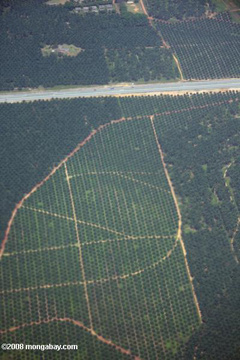 Oil palm plantation in Peninsular Malaysia. Photo by Rhett A. Butler Oil palm plantation in Peninsular Malaysia. Photo by Rhett A. Butler |
Though the crisis is imminent, caution remains the better part of valor and any action must still be closely studied and monitored. We have learned from biofuels how good intentions can go easily awry. Biofuels were pursued heavily both by industry, and earlier by environmentalists, without proper knowledge and preparation—and then as the truth came to light it was ignored, because there was profit in the business. The biofuel revolution, as it stands, has been devastating for our global environment and the human race in general. On the one hand it has caused food prices to rise worldwide, creating greater poverty in the world's already poorest regions, which is not a situation that can be allowed to continue. On the other hand, biofuels have led to massive deforestation of rainforests in Southeast Asia, threatening already diminished species, displacing indigenous peoples, and exponentially increasing greenhouse gasses: there is nothing 'green' in these consequences. Even biofuels grown in non-forested areas have been shown to expel more carbon than they save. In addition American and European biofuels have pushed agricultural production to the Amazon, where deforestation continues at astonishing rates. The lesson here: environmental policies should not be implemented purely for economic greed (it was a gold-rush for biofuels that has ended in a grave for global forests—our best protection against rising temperatures), and good government policies must rely on even better science. Future biofuels may be a solution, but present ones are damning both humans and the environment.
Measuring out the consequences of actions is imperative; at the same time open-mindedness is a necessity for fixing the issues we face. New solutions are constantly being weighed and measured in the environmental debate. Many of these receive little media attention, though their implementation (or lack thereof) will affect us for generations. While governments must remain open to all options, so must environmental groups. For example, using economic forces to save the world's remaining forests should not be disregarded simply because it employs the same forces that have devastated forests. When concerns are raised regarding REDD (Reducing Emissions from Deforestation and forest Degradation) and other such programs, they should have a solid basis and not be raised simply because many environmentalists are distrustful of industrial economies. In order for wide-scale change to occur, our economies will have to change. Perhaps one way to do that is by beginning to use it for good in the environment, rather than ill. If we can save forests by given them economic worth (through carbon storage, rain production, water purity, indigenous-peoples' habitat, eco-tourism, and biodiversity) then we can accomplish what hasn't been since the movement to save dwindling forests began decades ago. Since many of the solutions to the environmental crisis will be novel; we must remain open-minded or our efforts will flounder before they start.
Our growing consciousness of the environment, like any change in society, always runs the risk of appearing 'extremist'. To avoid such a label we would do well to be practicable in solutions, embrace hope over doom, and show a willingness to see issues from various sides. I am not suggesting revolutionary action or anything of that sort, but we must make clear to those in power that the days of willful ignorance are over. The environmental movement in general must grow in numbers, volume, and urgency to finally make those in power, our governments and media, to listen. But to fully take-on this issue, we must also face ourselves.
The Requirement of Sacrifice
| 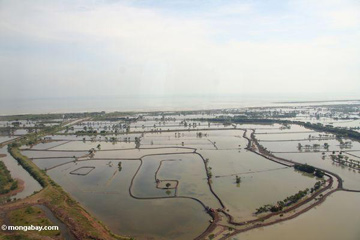 Mangrove forest turned shrimp farms in Sulawesi. Photo by Rhett A. Butler Mangrove forest turned shrimp farms in Sulawesi. Photo by Rhett A. Butler |
Every nation in the world must work toward the goal of environmental rejuvenation: none are exempt. To do this, all people will have to make changes, but the West, particularly, needs to peer deep into its life and soul. It is time we awoke from our long dream of resource and material entitlement.
Let me be blunt: the developed world must make sacrifices. There was a time in our history when sacrifice was not a dirty word, when our ancestors—not so distant—happily made sacrifices for larger causes. To create 'a more perfect union' in 1776 men and women were willing to put their lives and communities on the line. Few complained about having less meat during World War II or spending time and energy in 'victory gardens'. In the 1960s the Civil Rights Movement lost many of the generation's best leaders to create a more equitable and just society. Sacrifice is not new to the American ideal, even if it has been replaced with materialism.
What kind of sacrifices do I speak of? Put simply, we cannot consume as we have. Some of our insatiable consumption will be curbed by emerging technologies, but it will not be enough. No magic technology will solve the complex and massive problems we face. We have lived in a materialistic age for at least six decades, and it is an age we must leave behind. We have thrown our money at gadgets, toys, creature-comforts, at houses for two large enough for eleven, at six couches in one home and eight TVs in another, at hot-tubs, private boats, and second homes. All of these items require resources—tremendous resources—and we don't live in an infinite world. Resources have become increasingly scarce as human-population has increased, and the difference between the have-nothings and those who have-too-much has grown exponentially. Our desire for cheap products has pushed China into being the world's greatest carbon producer. Our desire for cheap furniture has helped illegally empty Asia's and South America's final forests. Our desire for cheap meat and soy currently presses farmers (and large-scale corporations) deeper into the Amazon. We have spent decades living off other nation's resources on the cheap. These have been immoral 'partnerships', where we strip them of their most precious treasures, for our luxury.
| 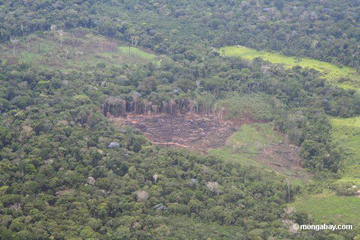 Deforestation in the Peruvian Amazon. Photo by Rhett A. Butler Deforestation in the Peruvian Amazon. Photo by Rhett A. Butler |
At the same time many nations desire to be the next America or Europe: what they don't understand is that we are not content even now. Shopping has become a psychological addiction for many in the West; advertisements are everywhere, spurring us on without reflection; owing superfluous stuff is not only a status symbol but a Western requirement. All of this is so seemingly common-place and culturally-ingrained that it is rarely questioned. Yet, where has a culture based on consumerism lead us? Not to happiness: not in a culture where quick-fixes are used ineffectively on deep problems. Not to security: instead, we have become increasingly insular, increasingly less-welcome, and increasingly paranoid over our material possessions. Not to ourselves: while we have driven the global environment to a new low, we have lost our own way, no longer knowing who we are or what we stand for. We have wasted decades chasing an empty dream.
There is no religion that espouses wealth—in fact most of them outright condemn consumerism, stating that it cannot bring happiness or meaning to the individual or the community. As well, all respected philosophical thinkers place other values far higher than materialism. What truth does one gain by spending a life harboring unnecessary stuff? What spirituality is there in focusing on Earthly possessions? Where is morality when products are more important than the welfare of fellow humans? Buying without need is a quick emotive fix with an increasing debt—both to ourselves, our children, and the world.
| 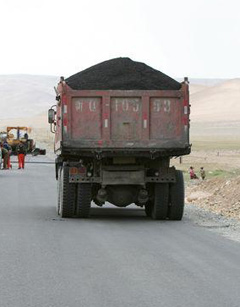 Coal-carrying truck in Xinjiang Province, China. Photo by Rhett A. Butler Coal-carrying truck in Xinjiang Province, China. Photo by Rhett A. Butler |
Change will be difficult, but hardly impossible. We need to build a new economy in the developed—and the developing—world based on services over materials. One that takes into account the innumerable services that healthy ecosystems give us: namely clean water, food, shelter, pollination, rain, workable soils, medicine, biodiversity, and carbon storage. We need an economy that includes an army of 'green' employees, working to repair the havoc that has been caused. I envision a 'New Deal'-type program that nations adopt to employ millions to take on tasks to help improve every community's environment: clean up pollution, stop erosion, plant trees, deal with invasive species, and a thousand other things. In the developed world, we need to find satisfaction by buying less, owning less, and thereby using and wasting less. The globe simply cannot survive more Americas and Europes.
Simultaneously, western nations need to put more resources and energy into pulling embattled nations out of poverty and conflict. Poverty—meaning a lack of necessities, such as food, water, health care, and security—is itself wholly immoral. Every human should have a right to the essentials of survival. In our world of plenty, it remains a great eye-sore on humanity that though we have food enough to feed every soul, people are still starving by the hundreds of millions. In addition, poverty time-and-again only leads to environmental destruction, not through wasteful indulgence but desperation. What parents wouldn't destroy a forest to save their children from starving?
| 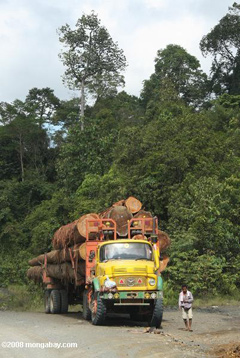 Logging truck in Sabah, Malaysia. Photo by Rhett A. Butler Logging truck in Sabah, Malaysia. Photo by Rhett A. Butler |
Let me be clear, I am not talking about Marxism or Communism, though I am sure that charge will come. What I am stating is that capitalism which does not recognize the sacristy of the environment and the community will only devastate itself. The continuing neglect of the importance of environmental services, essentially treating them as 'free', will result in complete market failure. Libertarians will perhaps argue with me—that I am stepping on the individual's right to consume whatever they want by whatever means they feel necessary. But in a finite and shared world, this argument has become not only impractical but immoral. A person may dream of killing the world's last tiger, and may set out upon such a goal, but does that mean we should let them? Our nation may want to buy more and more recliners, but if that means destroying the homes of an indigenous tribe, should our desire for new chairs still be satisfied, as it has in the past, without a single thought to consequences?
We should not fear the loss of the consumer philosophy; it was always a dead-end road. Instead we should welcome the freedom from insatiable and trivial want; we can be more than what we 'own'.
If only we shrug off these chains of materialism: a far more beautiful world awaits us....
Please continue reading at:
 Children in Kashgar, China. Photo by Rhett A. Butler
Children in Kashgar, China. Photo by Rhett A. Butler Gorilla in Gabon. Photo by Rhett A. Butler
Gorilla in Gabon. Photo by Rhett A. Butler Tree frog in Thailand. Photo by Rhett A. Butler
Tree frog in Thailand. Photo by Rhett A. Butler Seals in Glacier Bay, Alaska. Photo by Rhett A. Butler
Seals in Glacier Bay, Alaska. Photo by Rhett A. Butler Centipede in the rainforest of Malaysian Borneo. Photo by Rhett A. Butler
Centipede in the rainforest of Malaysian Borneo. Photo by Rhett A. Butler Oil palm plantation in Peninsular Malaysia. Photo by Rhett A. Butler
Oil palm plantation in Peninsular Malaysia. Photo by Rhett A. Butler Mangrove forest turned shrimp farms in Sulawesi. Photo by Rhett A. Butler
Mangrove forest turned shrimp farms in Sulawesi. Photo by Rhett A. Butler Deforestation in the Peruvian Amazon. Photo by Rhett A. Butler
Deforestation in the Peruvian Amazon. Photo by Rhett A. Butler Coal-carrying truck in Xinjiang Province, China. Photo by Rhett A. Butler
Coal-carrying truck in Xinjiang Province, China. Photo by Rhett A. Butler Logging truck in Sabah, Malaysia. Photo by Rhett A. Butler
Logging truck in Sabah, Malaysia. Photo by Rhett A. Butler